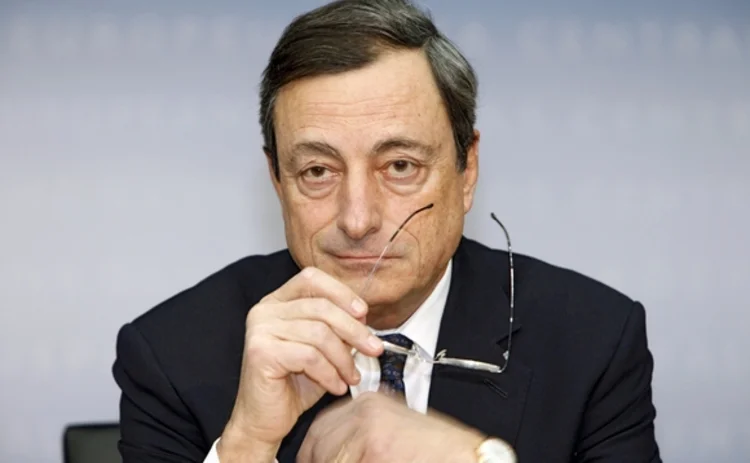
Governor of the year: Mario Draghi

Fears of an imminent collapse of the euro or withdrawal of some countries from the euro area have largely subsided since the height of the eurozone debt and banking crisis in 2011, as shown by the fall in sovereign bond yields of troubled nations such as Greece, Ireland, Portugal and Spain. This is due to government efforts to restructure economies and banking systems. But the huge improvement in sentiment would not have happened without the confident leadership of Mario Draghi, president of the European Central Bank (ECB).
The Italian banker and economist took over the helm of the world's second most important central bank in November 2011, a time of great stress and change. Europe was in the midst of its deepest crisis since the Second World War. At the same time, the ECB (one of the few highly regarded public institutions left in Europe) was split over how to handle the eurozone crisis. Two leading German central bankers - Jürgen Stark, ECB chief economist and executive board member, and Axel Weber, Deutsche Bundesbank president and ECB governing council member - had resigned early from their positions in 2011. The Germans protested the ECB's commitment to ‘monetise' European sovereign debt.
As a result, Draghi needed to provide confidence in the eurozone financial system and build a new executive team at the central bank practically from scratch - while simultaneously addressing dissent from the ECB's biggest shareholder.
Out of the current six-man ECB executive board, only Vítor Constâncio held his position prior to 2011. Peter Praet was appointed to the executive board just months prior to Draghi assuming the presidency, with Jörg Asmussen, Benoît Cœuré and Yves Mersch subsequently taking the other board posts. Draghi has earned praise for the way he deployed his team. Germany's Asmussen - the replacement for Stark - was asked to look after international activities, so drawing on his experience as a former deputy finance minister. The economics remit went to Praet; while Cœuré, a former head of the French debt agency, took charge of market operations. Mersch was drafted to work with Constâncio on banking supervision.
Draghi immediately set about creating the ECB's first three-year, long-term refinancing operation (LTRO) to bolster confidence in the funding capabilities of European banks. Launched in December 2011, the facility gave banks far longer-dated central bank financing than they had been eligible for in the past. More than 500 European financial institutions took advantage of €489 billion ($665 billion) of funding, the majority of which was used by banks in Greece, Ireland, Italy and Spain.
After Mario Draghi became president of the ECB, he changed the future of the European Monetary Union - of the euro - with one sentence
Despite concern that banks tapping the LTRO were using the proceeds to buy periphery European government debt - the so-called ‘Sarko trade' - the ECB offered a second 36-month LTRO auction to provide 800 eurozone banks with further €529.5 billion (€313 billion of net borrowing) of low-interest loans in February 2012. Draghi also reversed his predecessor Jean-Claude Trichet's most recent interest rate rises by cutting the refinancing rate from by 25 basis points to 1.25% on November 9 and then again by the same amount to 1% on December 14 - with another three more rate cuts due to follow in 2012-13.
Whatever it takes
The extraordinary measures were not in themselves sufficient to stem investor fears about the debt refinancing capacity of some eurozone countries as well as the health of the European banking system. As spreads of peripheral countries started to widen well past the average for the rest of the eurozone, Draghi again took bold steps. "Within our mandate, the ECB is ready to do whatever it takes to preserve the euro," Draghi declared in London in July 2012. "And believe me, it will be enough."
While Draghi was careful to stress the ECB would operate within its mandate, his comments heralded a flurry of behind-the-scenes wrangling to ensure he could unveil a scheme sufficient to restore confidence among financial market participants. They now expected a major new intervention by the central bank.
On August 2, 2012, Draghi unveiled the plan to offer outright monetary transactions (OMTs) but offered few real details about the scheme until September when the governing council voted on the measures. "The only thing to acknowledge is that the governing council decided on that issue very swiftly just after the summer holidays period," a top-level official tells Central Banking. "I will let you draw your own conclusions - but it did not take six months."
After feverish negotiation and consensus building, a programme was agreed by September whereby the ECB would be able to purchase government bonds issued by struggling Eurozone countries to address ‘irrational' fears of a euro area break-up being priced into national government bond rates. The policy included the proviso that a country would first have to request support from the European Stability Mechanism, whose assistance would be conditional on the acceptance of deficit reduction and structural adjustment policies. The conditions were included to ensure the ECB would intervene only when a country's public finances are on a sustainable path.
Despite previously being head of economic and financial policy at the German Chancellery, which had supported Draghi's appointment, Deutsche Bundesbank president, Jens Weidmann continued the German central bank's tradition not to support ECB purchases of eurozone sovereign bonds. But Draghi pressed ahead and secured approval for OMTs from the ECB governing council on September 6.
The ECB president stated at the time that the decision by the governing council was not unaninous, which combined with earlier comments effectively revealed Weidmann as the dissenter - something considered contrary to ECB etiquette. Some observers believe this to have been a mistake.
Nonetheless, Draghi's confidence in taking on Weidmann made it clear the ECB president planned to press ahead with his policy initiatives whatever the objections of the increasingly outflanked Bundesbank. The ECB chief also deployed Asmussen to defend the ECB's decision in a bid to secure greater public support in Europe's largest economy. He also actively courted the German media, declaring in an article in Die Zeit on August 29: "The ECB will do what is necessary to ensure price stability. It will remain independent. And it will always act within the limits of its mandate."
On October 24, Draghi then took the unusual step of defending the ECB's plans for OMTs in front of the Bundestag, Germany's parliament. Stating it was rare for an ECB president to speak to a national parliament (the ECB is only accountable to the European parliament), Draghi said the governing council had "very carefully" considered concerns the OMT programme would create inflationary risks and verge towards the monetary financing of countries' budget deficits. "We have specifically designed our interventions to avoid this," he said, explaining that any bond purchases made under the programme would be ‘sterilised' by reducing euro liquidity by the same amount as the value of the purchases. He added, should interventions need to take place, this would be on the secondary market, which is "fully in line" with the eurozone's prohibition of monetary financing of governments.
The ECB chief said he believed "the greater risk to price stability" was "falling prices in some euro area countries". "In this sense, OMTs are not in contradiction to our mandate: in fact, they are essential for ensuring we can continue to achieve it," he proclaimed.
The expectation that the ECB would engage in ‘unlimited' short-dated purchases of bonds helped to keep Spanish and Italian government borrowing costs at more sustainable levels, reducing the gap between their funding costs and the price for more highly rated eurozone sovereigns. In an era when communication poses such a challenge for central banks, especially in the multi-lingual euro area, Draghi pulled off a remarkable confidence trick.
Despite the provisos, Draghi's heroic efforts to restore confidence in the European debt markets raised serious concerns about whether the ECB had gone beyond its mandate. A reported 35,000 Germans filed complaints against the ECB's OMT measures and the matter was referred to Germany's Constitutional Court, which has the powers to limit German taxpayers' funds from being used in ‘unlimited' bond buying. The ECB proved a wily witness, being coy with the court in terms of releasing information that might count against it. This has been criticised as lacking transparency but demonstrates its ruthless determination to press through with OMTs. The court has yet to reach a verdict, despite expectations it would do so after the German elections in the second half of last year.
Draghi is well aware that central bank action plans, or even actions themselves, cannot solve the eurozone's problems - economic restructuring needs to take place at both a national and European level. As a result, the ECB president has pressed eurozone nations to pursue deeper integration to achieve stability on an aggregate level, while sticking with agreed fiscal reform programmes with multi-lateral lenders. "Since financial assistance can only be temporary, the quality of the reforms and their implementation are absolutely essential," Draghi said.
Supervisory role
Clearly, Europe's leaders and many commentators believe deeper financial, fiscal, economic and political integration in Europe is required. This includes further progress towards banking union - where supervision, resolution and deposit insurance takes place at a European level.
The ECB's hard-won for reputation makes it an ideal candidate to be able to supervise national banks in a more impartial manner than has been possible before. Due in part to its confidence in Draghi and his team, in October 2013 the European Council formally approved the creation of the single supervisory mechanism (SSM), a pillar of banking union putting the ECB in charge of overseeing the health of the continent's biggest banks, after the European Parliament approved the move the previous month.
The confirmation of the ECB's role as supervisor came after months of tense negotiations between European parliamentarians and the ECB over several legal provisions related to democratic oversight, notably regarding the appointment of the chair and vice-chair of the SSM's board of supervisors. There was substantial debate about how much information the board of supervisors would be required to give politicians about its deliberations and decisions. Draghi and his colleagues at the ECB held firm by refusing to provide detailed minutes of meetings of the board of supervisors to the European Parliament, but agreed to reveal the most important information discussed.
Draghi once more faced the Bundesbank and others that opposed the widening of the ECB's remit. The European Commission's own high-level expert group on the future of European banking supervision, led by Jacques de Larosière, has advised against a micro-supervisory role for the ECB, as acting in this area of supervision could impinge on the ECB's monetary stability mandate - supervisory support would likely involve finance ministry dealings that could potentially challenge the ECB's independence. Moreover, the ECB had no proven competence in supervision.
There are also serious legal issues, including whether or not it is possible to create a responsible body that is not stated in European primary law - ultimately leading to the threat of a supervised entity gaining a court order blocking its regulator from taking action.
The biggest practical issue - apart from finding hundreds, if not thousands, of competent bank supervisors - is establishing the true state of eurozone bank balance sheets. Draghi has made it clear the ECB will not take over supervision of banks until a ‘comprehensive assessment' of their balance sheets has taken place. This assessment is designed to give the ECB a clear picture of the soundness of the banks it is supervising - and ensure it does not immediately have to resolve a failing financial institution at a time when there will be no common European resolution authority or deposit insurance scheme.
The ECB's extraordinary policy actions and its acceptance of a new supervisory mandate may come back to haunt it. But as another top-level central banker points out, even though there have been differences in opinion, the ECB as an institution has been able to act and that has been understood in the markets. Such action probably saved the euro.
As Stanley Fischer, governor of the Bank of Israel until July 2013 and a former teacher at MIT where Draghi studied, says: "After Mario Draghi became president of the ECB, he changed the future of the European Monetary Union - of the euro - with one sentence."
Only users who have a paid subscription or are part of a corporate subscription are able to print or copy content.
To access these options, along with all other subscription benefits, please contact info@centralbanking.com or view our subscription options here: http://subscriptions.centralbanking.com/subscribe
You are currently unable to print this content. Please contact info@centralbanking.com to find out more.
You are currently unable to copy this content. Please contact info@centralbanking.com to find out more.
Copyright Infopro Digital Limited. All rights reserved.
You may share this content using our article tools. Printing this content is for the sole use of the Authorised User (named subscriber), as outlined in our terms and conditions - https://www.infopro-insight.com/terms-conditions/insight-subscriptions/
If you would like to purchase additional rights please email info@centralbanking.com
Copyright Infopro Digital Limited. All rights reserved.
You may share this content using our article tools. Copying this content is for the sole use of the Authorised User (named subscriber), as outlined in our terms and conditions - https://www.infopro-insight.com/terms-conditions/insight-subscriptions/
If you would like to purchase additional rights please email info@centralbanking.com
Most read
- ECB says iPhone is currently incompatible with digital euro
- Supervisors grapple with the smaller bank dilemma
- ‘Do I die, or do I survive?’ Officials reflect on Basel III complexity







